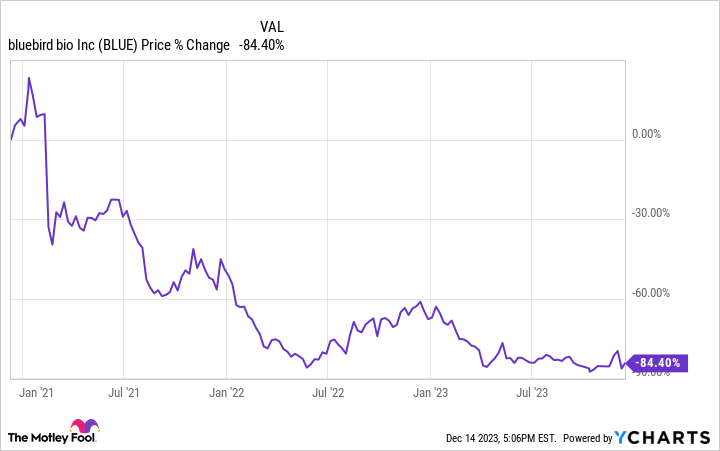No stock is entirely risk-free, especially stocks like Bluebird Bio (NASDAQ: BLUE). The small-cap company’s shares have plunged by 84% in the past three years.
The gene editing specialist has had clinical, regulatory, and financial issues that account for its lagging the market. However, some might think that at current levels, Bluebird Bio is practically a steal.
Is that the case? Let’s consider one reason to buy the stock and one to avoid it.
Bluebird Bio is an innovative company
Small-cap biotechs often make names for themselves by breaking new ground and developing novel therapies for rare or difficult-to-treat diseases. That’s not always the playbook they try to emulate, but it often is.
That’s what Bluebird Bio was seeking to do. The company attempted to develop gene editing therapies for rare diseases. Though promising, this field has had its challenges.
However, the company has been a success in this category. The biotech has developed and marketed not one, not two, but three gene editing treatments.
The first was Zynteglo, which targets transfusion-dependent beta-thalassemia, a rare blood disease. The second was Skysona, a therapy for a rare neurodegenerative condition called cerebral adrenoleukodystrophy. The third, which earned approval in the U.S. just recently, is called Lyfgenia, a treatment for sickle cell disease (SCD), which is another rare blood-related condition.
Most gene editing-focused biotechs have had trouble launching just one product on the market. Bluebird Bio now has three, which is no small feat. While the company’s pipeline is currently thin (at best), Bluebird Bio’s abilities are well established.
The company’s innovative potential is a significant selling point in its favor.
Profitability looks far away, at best
While Bluebird Bio’s regulatory approvals are impressive, investors ultimately want to see strong financial results. That hasn’t happened yet for the biotech.
Zynteglo and Skysona have been on the U.S. market for over a year now, but the company’s financial results still look unimpressive. In the third quarter, Bluebird’s revenue was just $12.4 million, although that significantly improved from its almost zero revenue in Q3 2022.
On the bottom line, Bluebird Bio’s net loss per share of $0.66 was also better than the loss per share of $0.94, recorded in the year-ago period. One reason why Bluebird’s revenue and earnings are taking a while to improve substantially is that gene editing treatments are complex and take a while to administer. Further, Zynteglo and Skysona have a pretty slim combined target patient population of, at most, 1,540 people in the U.S.
Fortunately, Bluebird Bio plans to target roughly 20,000 patients with Lyfgenia. But there are still issues.
First, Lyfgenia will encounter the same problems as Zynteglo and Skysona. It will take some time before solid, consistent money starts coming in. Second, the U.S. Food and Drug Administration also recently approved Casgevy, a competing gene editing therapy for SCD.
Casgevy was developed by the team of CRISPR Therapeutics and Vertex Pharmaceuticals. The latter is a biotech giant with big pockets, which will help it speed up the commercialization process of Casgevy. Further, while Lyfgenia is priced at $3.1 million, Casgevy will cost just $2.2 million.
With all these issues, it’s not clear whether Bluebird Bio can turn a profit anytime soon.
Is Bluebird Bio a buy?
It would take a lot for Bluebird Bio to deliver excellent results in the next five years. It’s not impossible, but a lot — almost everything — would have to go right for the company. That’s not something investors should bet on — at least those with an average tolerance for risk. That’s why most should stay away from Bluebird Bio, as there are much more promising biotech stocks on the market.
Investors with a high tolerance for risk may consider initiating (very) small positions in the biotech, but be advised: The shares you buy could become practically worthless in a few years.
Should you invest $1,000 in Bluebird Bio right now?
Before you buy stock in Bluebird Bio, consider this:
The Motley Fool Stock Advisor analyst team just identified what they believe are the 10 best stocks for investors to buy now… and Bluebird Bio wasn’t one of them. The 10 stocks that made the cut could produce monster returns in the coming years.
Stock Advisor provides investors with an easy-to-follow blueprint for success, including guidance on building a portfolio, regular updates from analysts, and two new stock picks each month. The Stock Advisor service has more than tripled the return of S&P 500 since 2002*.
*Stock Advisor returns as of December 11, 2023
Prosper Junior Bakiny has positions in Vertex Pharmaceuticals. The Motley Fool has positions in and recommends CRISPR Therapeutics and Vertex Pharmaceuticals. The Motley Fool recommends Bluebird Bio. The Motley Fool has a disclosure policy.
1 Green Flag and 1 Red Flag for Bluebird Bio Stock was originally published by The Motley Fool
Signup bonus from





